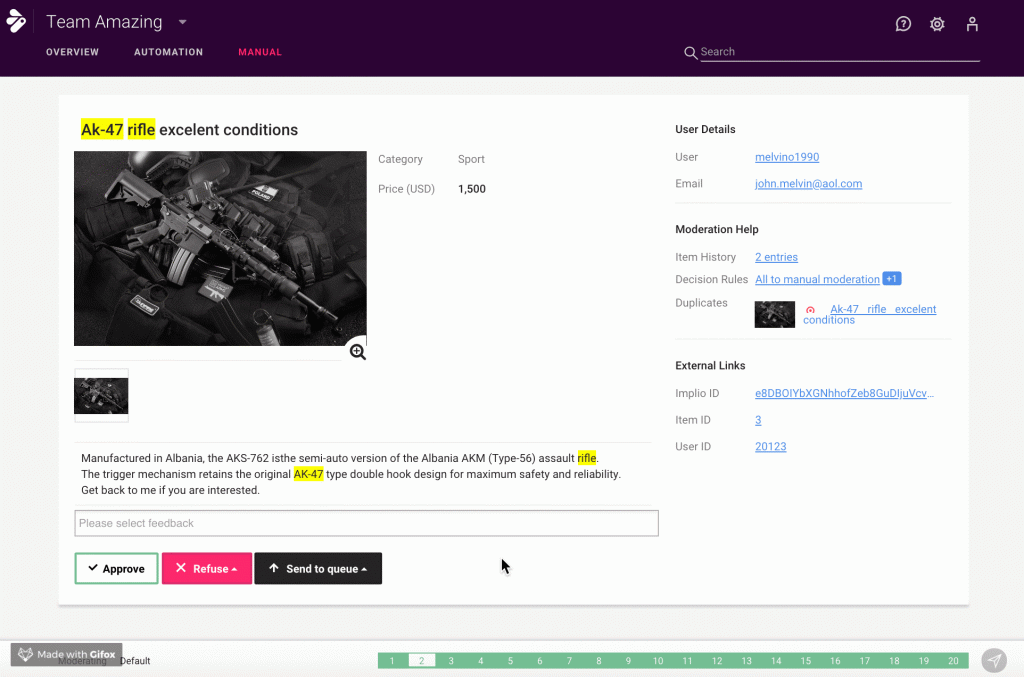Contents
Catfishing and romance scams are almost woven into our lives now. Welcome to the age of fake dating profiles. Let’s examine what content moderators are looking for to catch romance scams. That way, they can remove those fake profiles before they target your customers.
Before we start: Get insights into automation rules that can be set up to keep scammers off your dating app in the first place.
What to look out for
- Language
- Message content
- Profile
- Geolocation
The poetry of fraud – romance scammer language
The majority of romance scammers are not people with English as their native language, and that is visible both in their profiles and the messages they send.
Furthermore, many fraudsters are part of a bigger scam organization. This means they share scripts and wording that have delivered successful results with their target group. While it’s bad news that optimized messaging for scamming is spread, it’s good news for those trying to spot the romance scam profiles as we can search for known patterns in the language used.
Here are some examples of language and wordings often used by romance scammers on online dating sites:
- “I am a God Fearing man/woman”
- “I am looking for a serious woman”
- “I am looking for an honest woman/man”
- “I am a sincere man/woman”
- “I am so much blessed to have you in my life”
- They have a tendency to overuse terms of endearment like “my dear”, “babe”, “angel” and “darling”
- And they often mix pronouns (he/she, him/her)

Message content gives insights into tactics
Language is a great way to do a cursory check for scammers on your site. But to dig deeper, you need to look at the message content. You will see two primary recurring patterns by reading and tracking private messages sent by scammers on online dating sites.
Generic messages to multiple people
Most scammers will send out waves of generic messages to multiple people in a very short time. More sophisticated scammers might pace their outreach, but looking through the message history should quickly reveal the difference between a real user and a fake profile. If you see row after row of identical messages, it warrants further investigation
Attempts to move off-site quickly
Scammers want to move their victims away from regulated and moderated environments like the inbox of a dating site and into the wild of Skype or email conversations as quickly as possible.
They know that it’s only a matter of time before the moderation process of their site of choice catches up with them. As such, their first message to a potential victim will often contain instructions on communicating with the outside of the site.
On apps and websites where communication between members is a premium feature, it should be noted that non-paying members who are not scammers might attempt the same to avoid fees. However, it is still a scam marker that shouldn’t be ignored, and the profile should at least be further investigated to ensure it’s genuine.
Target group
Most dating sites ask users to set a potential partner’s age range. Scammers are rarely picky. In many cases, their choice will be 18-99, but if they do pick a preference, it will generally be 10 or 20 years older than their own claimed age.
How they present themselves
Dating profiles carry a wealth of information and are a great place to look for scam markers. Profile pictures are one of the easiest things to investigate to identify if a profile is genuine (or not).
Photos
Scammers used to look to model stills or stock photos when creating their fake persona. You should still be wary of photos that look too professional, but scammers increasingly use stolen photos of real people. This activity has been made possible by the rise of social media, where people share a wealth of picture material featuring themselves and their lives.
The female profiles will have pictures of young and beautiful women, while the male profiles will mostly have photos of more mature men, good-looking but not model material.
When reviewing a picture that seems wrong, moderators can do a Google search to see if the images show up somewhere else. Scammers will often reuse pictures on multiple dating sites, and a quick search will often reveal if a picture is stolen from an unsuspecting person.
How they describe themselves
Romance scammers are trying to sell a dream as fast as possible. They put a lot of effort into ensuring that their “offering” is as perfect as possible for their target prey.
Profile descriptions can vary, but a few things can be found in most romance scam profiles.
- Female profiles: Almost always mention or hint at them being the perfect housewife who loves cooking, taking care of kids, and making their man happy.
- The male profiles: Emphasizes that they are family-oriented, successful, and loyal.
- Sob story: There will almost always be a sob story trying to capture the readers’ emotions. Scammers often mention a previous spouse who is either deceased or cheated on them. They are now ready to move on but are scared of getting hurt.
- Dare to love again: They will, however, suggest that the profile of their potential victim profile made them believe in love again. This way, the victim is made to feel special and needed.
Occupation
Occupation is a description that is vital to spot a romance scammer. The scammers often use their claimed profession as part of their scheme to lure money out of potential victims. A very common ruse that scammers use to get money out of their victims is claiming that they are stuck in a contract and need money to buy their way out.
Claimed occupation differs a bit depending on gender.
Fake male profiles often say they work as
- Military
- Missionaries
- Engineers
- Businessmen – who travel frequently
Female profiles are a bit more varied. They can be studying or holding a creative job, but a popular occupation for “female” romance scammers seems to be volunteering for good causes (for instance, at an orphanage). This gives them an excuse for being overseas.
The importance of geolocation
A good indicator of whether an account should be further investigated is checking the IP it uses to access your site. This will help you determine the geolocation of the person behind the account. It is not a surefire way to spot all scammers, of course, as many hide behind proxies, and as time goes by, romance scammers get better and better at covering their digital footprints.
But we wanted to mention IP regardless, as it is a scam marker that can help paint a picture of whether or not an account is genuine.
You’ll find a full list of variables on our help page) This way, you can automatically send any content that fulfills a specific condition directly to your manual moderators. If you have a hard rule on user location, even reject content from being posted from specific IPs.

Summary and key takeaways
We’ve covered a lot of different things to look out for to spot romance scammers, but how can this be applied to your moderation process?
First, we suggest ensuring you have an IP lookup function in your back office tool that filters out all accounts accessed by suspicious IPs and funnel these through to manual moderation or, if you want to take an even firmer stance, automatically block any accessed from blacklisted IPs.
Secondly, list all the words and expressions regularly used by romance scammers. We have given quite a few examples in this blog post, but you can expand on that list easily as time goes by. Keyword lists will allow you to automate some of the moderation processes for keeping fake dating profiles off your site.
Here’s how Implio highlights keywords

Thirdly have your system catch accounts that send out duplicate messages to multiple people. Have the accounts manually checked to investigate if they are genuine.
And finally, ensure your moderation team is continuously trained and updated on the ever-evolving tricks of romance scammers. They need to know exactly what to look for to be truly efficient at keeping the users safe.
More on the Besedo blog
See allSee all articlesThis is Besedo
Global, full-service leader in content moderation
We provide automated and manual moderation for online marketplaces, online dating, sharing economy, gaming, communities and social media.





